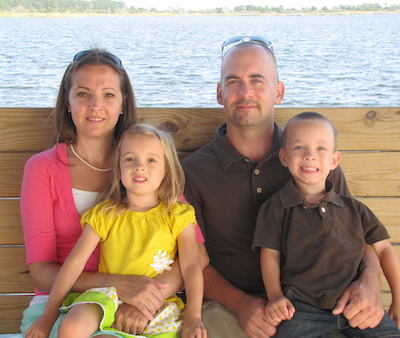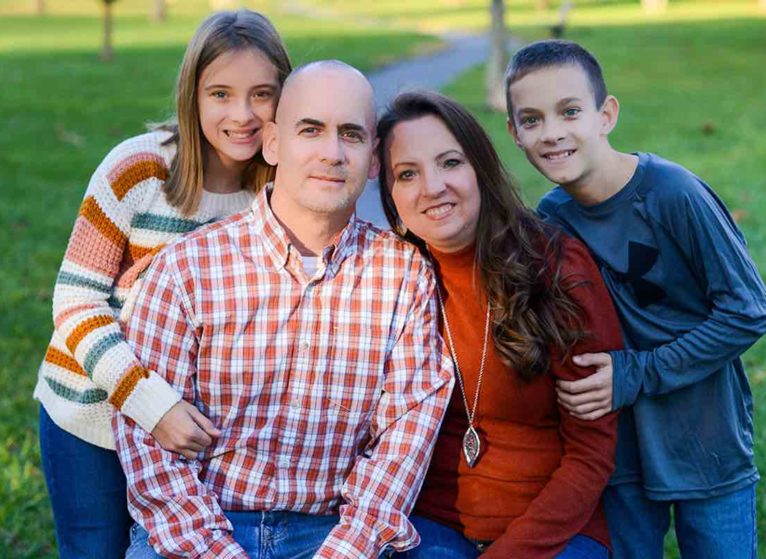This post was originally published in April 2014 and updated in April 2021.
Tina Continues to Shine
Since Tina’s lung transplant in 2013, her life has been pretty normal for a mom of two. Her twins are 11 years old, and her schedule revolves around them. She stays pretty busy taking them to baseball practice and horse-related events.
Looking back at her pre-transplant life, she didn't realize how sick she was. To her, it was just life with cystic fibrosis. Now she says her quality of life is so much better.
She had some challenges after her transplant surgery. During the first year, she had to be hospitalized for 3 weeks after she got respiratory syncytial virus (RSV) from her kids. She had one other virus-related hospital stay. She feels lucky to stay relatively healthy.
How COVID Affects a Transplant Recipient
Tina and her kids didn't leave the house during the first couple of months of the COVID-19 pandemic. Her husband ran all the errands to keep everyone safe and healthy. She stayed in close contact with the UVA Transplant team for advice.
Tina received her second shot of the COVID vaccine last week. She was very nervous at first because it hasn't been tested on transplant recipients. But her social worker, Bill Potts, assured her that the exhaustion she felt after the shot was normal.
Getting Active Again
After having kids, Tina became a stay-at-home mom, but she's ready to get back to working outside of the home. In 2017, she started working part-time at her church, handling administrative duties. Once the pandemic started, she had to quit.
She's taking courses at Blue Ridge Community College to improve her computer skills. In two years and 20 credits, she'll be ready to see what's out there.
Tina was very active until her cystic fibrosis became too severe. She credits exercise with being strong enough to even have her transplant. She loved to run and hadn't ran since high school.
Now 45, she's running 2-3 miles a day. When she speaks to others about her transplant journey, she uses this to encourage others about getting on a waitlist. Besides the couple times admitted to the hospitals, her post-transplant experience has seen very little bad days. She stresses to others the difference is either struggling to breathe or with a transplant running again.
Tina feels blessed every day. Her kids were three at the time of her surgery, and without her transplant, she would've missed watching them grow up. Her gratitude for the gift of life grows every day.
Tina's Transplant Journey
Tina Tinsley’s dream was to be a mother, and her wish was granted after years of trying. But because of cystic fibrosis, she couldn’t do basic tasks that most moms take for granted. She couldn’t go to the grocery store or give her children baths. When she left the house, she had to take an oxygen tank along with her.

It wasn’t always this way. Tinsley, now 38, was a physically active child, but cystic fibrosis changed all that as she got older.
A hereditary condition that develops during childhood, cystic fibrosis primarily affects the respiratory system, pancreas and sweat glands. The body produces excess mucus that clogs the bronchi, which are the main passageway into the lungs. This leads to breathing difficulties and infections.
Infertility and IVF
Cystic fibrosis also causes infertility. Tinsley, who lives in Staunton, Va., was told she’d never have children, but she wasn’t one to take no for an answer. She and her husband, Phillip, kept trying. After numerous procedures and two in vitro fertilization (IVF) attempts over eight years, they were successful, and twins Cole and Sara were born in 2009.
Her faith in God kept her going through the long and often-disappointing process, she says. The twins were in the NICU for many weeks after their birth. “UVA took excellent care of them and made sure they were coming home,” she says.
After the birth of the babies, her cystic fibrosis symptoms worsened. “My husband says it really took a toll on my body,” she says. “But even if I knew that, if I had been warned, I don’t know if I would’ve listened. I really wanted to have kids.”
Family History of Cystic Fibrosis
Things took a turn for the worse in October 2013, when Tinsley was admitted to UVA with a lung infection and put on a ventilator and feeding tube. “I nearly left here. I almost died,” she says. For Tinsley, that was a very real possibility. Her brother died of cystic fibrosis three years ago at the age of 39. She also has two cousins with the condition, one of whom died from it.
Antibiotics controlled her infection, and eventually she was strong enough to be put on the lung transplant waiting list. Still, she wasn’t ready to admit she needed a transplant. She thought she might still get better and needed the convincing of her doctor, Max Weder, MD. “He said I wasn’t going to live if I didn’t have the transplant,” Tinsley says. “He’s by far the best physician I’ve ever had. We make a good team. The whole transplant team is just phenomenal.”
Tinsley also got support from other members of the transplant team at UVA, including social worker Bill Potts and pre-transplant coordinator Heidi Flanagan, RN.
“Heidi knew how nervous I was, and she was so compassionate. She told me to look ahead a year to what my life was going to be like.”
Potts, she says, asked her what she wanted from the rest of her life. “I told him I just wanted to be a mama to my babies. He said, ‘Transplant can give you that.’”
Lung Transplant and Recovery
While Tinsley was in the hospital, Phillip, Tinsley’s husband of 18 years, would drive 40 miles from Staunton to Charlottesville to be with her and then drive home to be with their children.
Christine Lau, MD, performed Tinsley’s lung transplant, which lasted almost 10 hours. Tinsley was removed from the ventilator the first day after her surgery. “I was up sitting in a chair the next day and walking in the hallways the day after that.”
Why Choose UVA
The only comprehensive transplant center in Virginia, we have many transplant programs to help you get healthy again.
She stayed in the MICU (medical intensive care unit) for two weeks following the surgery and worked with a respiratory therapist, physical therapist and nutritionist to regain normal function. Tinsley also takes immunosuppressants, drugs that prevent her body from rejecting her new lungs. Transplant recipients take anti-rejection medications for the rest of their lives.
Weder says Tinsley’s case is a special one. It’s not often that patients go from being near death to walking out of the hospital several weeks later. “She is a unique case and serves as a great example of how everyone on our MICU and transplant teams work together in difficult transplant cases.”
Along the way, the Tinsley family received lots of help. People in their Staunton community raised funds to help cover some of their transplant medical expenses. Another group made sure the children had presents under the tree this past Christmas when neither parent had the time or resources to go shopping. The Tinsleys’ church community donated weeks of meals during her hospitalization. The Tinsleys also received a grant from a nonprofit that paid for one round of their IVF procedure.
Tinsley, whose motto is “Live to fight another day,” says she feels better now than she’s felt since she was a child. She can give her children those baths, she goes to the grocery store and the oxygen tank is gone. She hopes to share her story with local churches and maybe write a book someday. Her new goals also include running a marathon. “I know I can do it,” she says.



What an inspiring story!! I had no idea that Tina had been going through such a rough time with serious health problems. Their faith in God giving them children was already admirable but to read about everything else just makes me speechless in admiration to their courage.
My brother Ron just turned 60 and has Pulmonary Fibrosis and needs a lung transplant. He is amazing and actually donated one of his kidneys years ago to extend the life of our father. Now it is Ron’s turn. If he does not get a kidney he will die. He is considered a high risk patient because of the previous kidney donated he did, etc. Unfortunately, he was misdiagnosed and the specialist ordered a lung biopsy. At that time (a couple of months ago), he was able to do everything and only had slight breathing issues. After the lung biopsy, the Pulmonary Fibrosis spread like wildfire and he is now on the strongest oxygen and cannot even walk across the room. He is a wonderful loving husband, father and grandfather. He has so much to live for and desperately needs a transplant. Any assistance is greatly appreciated. DJCinOC@gmail.com. Donna
Ron needs a lung not a kidney (I made a mistake in my last comment).
This is so wonderful! 2-3 miles a day? that’s awesome!!! Family looks beautiful!